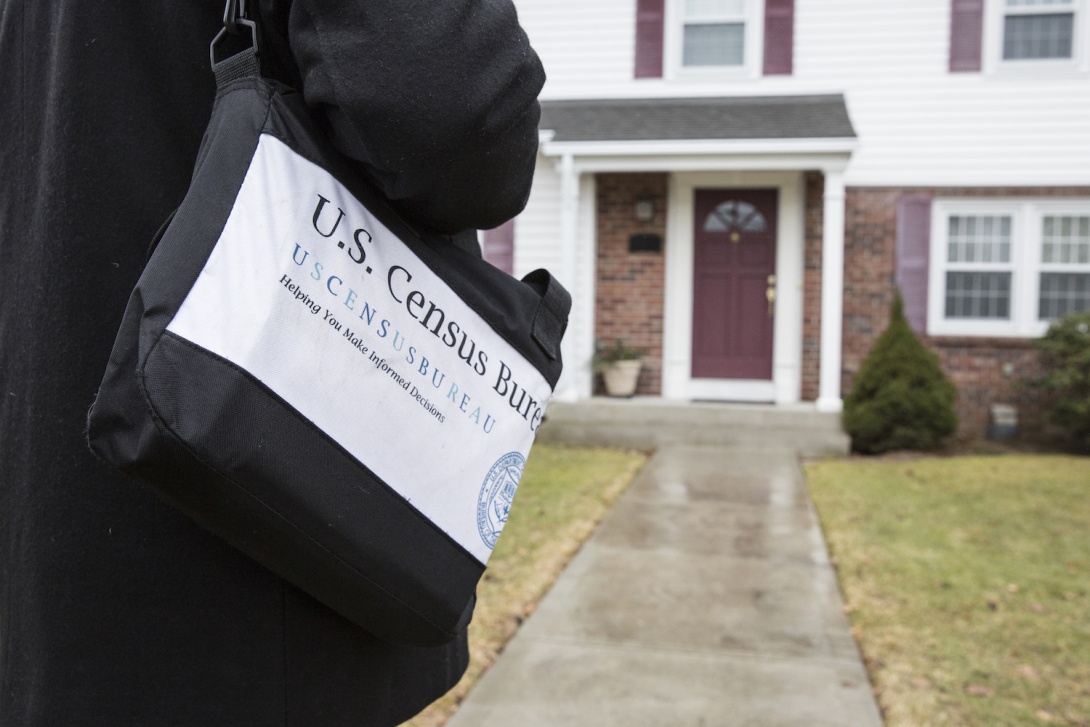The contested census citizenship question could cost the South

The Trump administration's plan to add a citizenship question to the 2020 census could depress participation by Latinos and other groups, which would have political and economic ramifications for Southern states. (Photo from the Census Bureau website.)
The Trump administration's proposal to add a question about citizenship to the 2020 census has already drawn widespread criticism and lawsuits. But recently discovered information made public by The New York Times has intensified the controversy over the question, which has serious implications for the political and economic well-being of Southern states.
A Republican political strategist and redistricting expert lauded as the "Michelangelo" of gerrymandering, Thomas Hofeller, died last year at his home in North Carolina, where he played a key role in the redrawing of congressional maps after the 2010 census that shifted the state's delegation from a 7-6 Republican edge to a 10-3 GOP advantage. Files on his hard drives, obtained by his estranged daughter after his death and handed over to Common Cause, offered a number of shocking revelations, including that North Carolina lawmakers had lied to a federal court in 2017 when they said he wouldn't have enough time to draw new maps for a special election to remedy the gerrymandered legislative districts the watchdog group had sued over. In fact, the files show Hofeller had nearly completed the maps at that time.
The files also reveal that Hofeller helped the Trump administration's efforts to add the controversial citizenship question to the upcoming census. Among the documents was an unpublished 2015 analysis Hofeller undertook for the conservative news outlet the Washington Free Beacon looking at the effect of drawing political maps based not on a state's total population, as is current practice, but on counting only U.S. citizens of voting age. Following his examination of legislative districts in Texas, he concluded that such a switch would be "advantageous to Republicans and Non-Hispanic Whites." Federal Election Commission filings showed the Republican Party paid him more than $2 million for his work.
But there was a problem: The data needed to draw such maps doesn't exist. It could only be attained, he said, if the 2020 census included a citizenship question. The hard drives showed that Hofeller penned a crucial portion of the Department of Justice's (DOJ) request to the Census Bureau to include the citizenship question. He claimed that the question is "critical" to the DOJ's enforcement of the Voting Rights Act — a law he previously cited to justify maps he drew that disadvantaged black voters.
The Hofeller documents regarding the citizenship question were recently filed by plaintiffs in New York v. Department of Commerce, the ongoing federal lawsuit challenging the question's legality. The plaintiffs include 17 states, among them North Carolina and Virginia, as well as several cities and the U.S. Conference of Mayors. They argue that the addition of the citizenship question would violate the U.S. Constitution's provision that requires not just a population count, but an accurate one.
There's concern that such a question would depress responses from Latinos, Asian Americans, and immigrants fearful of exposing their citizenship status to the federal government. Although it is not legal for census information to be shared between federal agencies, it has happened in the past. For example, the Census Bureau faced scrutiny in 2004 for providing the Department of Homeland Security with data on Arab Americans' ZIP codes. In today's political climate rife with anti-immigration sentiment, the fear that non-citizens' census responses might be used against them is not unfounded.
At the same time, the Latino community is already considered a "hard to reach" population that has been traditionally undercounted in the census, along with undocumented immigrants and residents with low English proficiency. The follow-up analysis of 2010 census data found that the Latino population was undercounted by 1.5 percent. Meanwhile, the Urban Institute predicts that adding the citizenship question to the 2020 census would lead to Latinos being undercounted by as much as 3.57 percent, which could leave as many as 789,600 Latinos uncounted in the Southern states. Florida, Georgia, and Texas are among the states at greatest risk of an undercount.
The Census Bureau has advised against including the question, suggesting that it poses a "major barrier" to an accurate count due to the anticipated lower response rates from households with non-citizens. A survey conducted by UCLA found that 11 to 18 percent of immigrants reported they would not respond to the census if the citizenship question was on it.
In recent years the South has seen an influx of immigrants, making it especially vulnerable to the effects of a citizenship question. That would have major implications for the region's political future. Florida is on track to gain two congressional seats after the 2020 census, and North Carolina to gain one, but the citizenship question could derail that. A serious undercount could also cost Alabama a seat. And if Texas's 1.6 million undocumented residents do not respond to the census, that state could lose two congressional seats.
The question could also hurt the region economically. Besides determining congressional seats and electoral college numbers, the census is used to allocate up to $880 billion in federal tax dollars for public services such as Medicaid, the public health insurance program for low-income people — and an undercount would affect how those funds are distributed among states. For example, every uncounted person in the 2010 census cost Louisiana $1,272 in Medicaid funds. A single person missed in North Carolina is equivalent to a loss of $16,000 in Medicaid and other federal funding over a 10-year period. And if there's an undercount of Latino residents in 2020, Texas stands to lose up to $378 million annually in Medicaid funds.
Three federal judges have already ruled against the citizenship question, although none determined that the Trump administration conspired to intentionally discriminate against people of color. In light of the new evidence, however, civil rights groups have asked a federal judge in Maryland to reconsider his ruling.
Following a ruling to block the question from a federal district court in New York, the first court to do so, the Commerce Department appealed directly to the U.S. Supreme Court. After oral arguments in April, the justices appeared inclined to vote 5-4 along ideological lines to allow the Trump administration to go forward with the question. It is unclear how, if at all, the information from Hofeller's files will influence the final ruling, since the justices have already begun writing their opinions. In order for the census to be carried out on schedule, an official verdict must be made by the end of June.
Tags
Sarah Moore
Sarah Moore is an intern with the Institute for Southern Studies. She is pursuing bachelor's degrees in political science and gender and women's history at the University of North Carolina at Chapel Hill.
